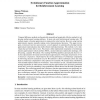178 search results - page 34 / 36 » Probabilistic policy reuse in a reinforcement learning agent |
ATAL
2008
Springer
13 years 7 months ago
2008
Springer
The application of reinforcement learning algorithms to Partially Observable Stochastic Games (POSG) is challenging since each agent does not have access to the whole state inform...
IIE
2007
13 years 5 months ago
2007
We investigate the possibility to apply a known machine learning algorithm of Q-learning in the domain of a Virtual Learning Environment (VLE). It is important in this problem doma...
IAT
2010
IEEE
13 years 3 months ago
2010
IEEE
It is crucial for embedded systems to adapt to the dynamics of open environments. This adaptation process becomes especially challenging in the context of multiagent systems. In t...
ICML
1999
IEEE
14 years 6 months ago
1999
IEEE
Excerpted from: Boyan, Justin. Learning Evaluation Functions for Global Optimization. Ph.D. thesis, Carnegie Mellon University, August 1998. (Available as Technical Report CMU-CS-...
CORR
2010
Springer
13 years 5 months ago
2010
Springer
Temporal difference methods are theoretically grounded and empirically effective methods for addressing reinforcement learning problems. In most real-world reinforcement learning ...

